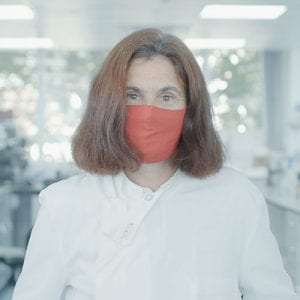
As part of our #BristolUniWomen campaign to mark International Women’s Day 2021, we’re meeting women from across the University of Bristol community who have been using their expertise to tackle the pandemic, from carrying out world-class research to helping on the frontline of the NHS.
Christiane Berger-Schaffitzel is a Professor of Biochemistry. Her team has discovered a ‘druggable pocket’ inside the SARS-CoV-2 spike protein.
Your research has focussed on Covid-19 recently. Could you tell us a little more?
The University closed in March 2020 during the first lockdown. Only scientists contributing to COVID-19 research could continue in the laboratories. Together with my colleague and husband (Professor Imre Berger), and volunteers from our groups, we were tasked to support clinicians, virologists and other scientists in the Bristol UNCOVER group, led by Professor Adam Finn in Bristol Medical School.
They needed SARS-CoV-2 antigens for their work, which we prepared for them. The major antigen is the Spike protein which sits on the surface of the SARS-CoV-2 virus. It is needed for serology testing and vaccine development. The Spike protein is responsible for binding and infecting human cells.
My team analysed the Spike by electron cryo-microscopy, a powerful technique to depict the ultrastructure of biological samples. Surprisingly, we discovered a previously unknown pocket within the Spike. This pocket was occupied by a small molecule, linoleic acid (LA). LA is an essential fatty acid, it is part of Vitamin F. We found that the LA interactions resulted in a form of the Spike which can no longer bind and infect cells. This is very exciting because it suggests that LA basically is an antiviral drug that could be used to help overcome the pandemic, and we are working very hard to make this happen.
What have been the biggest challenges or triumphs for you during the pandemic?
For me, as for many others, a main challenge is that I now work a lot from home. The time and space separation between work and personal life becomes blurred. We have two children. During the day, home-schooling and supporting them now competes with zoom meetings with students and colleagues, and the usual academic work. It is tiring, and I feel like I am putting in a lot more hours than under normal circumstances. On the other hand, it is also very pleasant and gratifying to spend more time with the children.
What is it like being a woman in academia? Have there been times when you have either faced inequality or had to challenge it?
There were and are many successful and celebrated female scientists in the UK. The Nobel Laureate Dorothy Hopkins, a stellar female structural biologist, was Chancellor at Bristol. Being a woman in academia feels more normal and natural in the UK than at many other places. Nonetheless, bias in the recruitment process and inequality in pay are an issue everywhere. My husband and I, for exactly the same work, have never received the same salary throughout our careers.
Which women have inspired you in your career?
Looking back at my studies and PhD thesis in Germany and Switzerland, there was a remarkable, complete absence of female professors. I was inspired by female colleagues that were a few years ahead professionally. I could feel however that things were changing, and more female scientists were promoted and could advance in their academic careers more recently. The most important woman who truly inspired me is my mother. She encouraged and supported my career choices. She strongly believes in equality and independence; she is profoundly convinced that a decent education and a good job are the key to personal security, freedom and financial independence. She instilled these beliefs in me, and she is right.
What advice would you give to your 13-year-old self?
I would advise to have more self-confidence and to not be anxious about the future. Perhaps, to see life more as the exciting adventure it is and be open and welcoming to opportunities that arise. As a teenager, I was probably too dependent on recognition by others. I only learned later to be resilient and accept that success and failure are just two sides of the same coin.
What are you most proud of?
Our two children of course! They are by far the best and most exciting projects I have ever been involved in.
